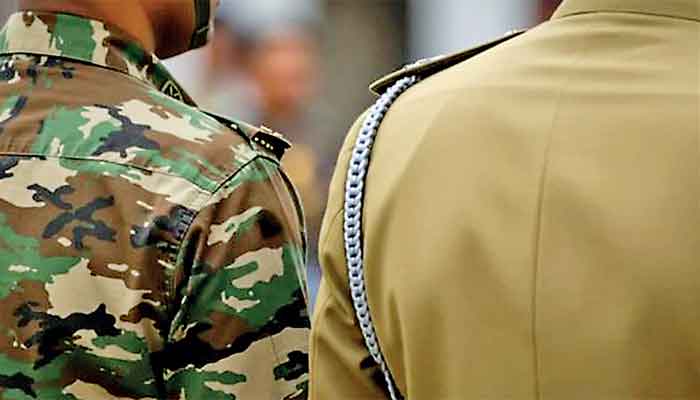Saturday Feb 21, 2026
Saturday Feb 21, 2026
Tuesday, 17 June 2025 02:29 - - {{hitsCtrl.values.hits}}

The integration of retired tri-forces personnel into civilian policing roles exemplifies forward thinking governance
 Sri Lanka is embarking on a transformative initiative to enhance its law enforcement capabilities through a visionary policy that recruits retired tri-forces personnel into the Sri Lanka Police Service. This groundbreaking initiative, recently endorsed by the Cabinet, aims to recruit 10,000 retired military personnel under the age of 45, marking a significant paradigm shift in how the nation approaches public security and human resource management within the public sector.
Sri Lanka is embarking on a transformative initiative to enhance its law enforcement capabilities through a visionary policy that recruits retired tri-forces personnel into the Sri Lanka Police Service. This groundbreaking initiative, recently endorsed by the Cabinet, aims to recruit 10,000 retired military personnel under the age of 45, marking a significant paradigm shift in how the nation approaches public security and human resource management within the public sector.
Harnessing the untapped potential of military veterans
Military service in Sri Lanka follows a structured career path that often concludes while personnel remain in their professional prime. Commissioned officers typically retire around age 55, bringing with them invaluable leadership experience, strategic insight, and operational expertise. Meanwhile, the majority of non-commissioned officers and other ranks complete their service after 22 years, usually in their early 40s, combining youthful energy with substantial practical experience.
This demographic represents an extraordinary reservoir of uniquely talented individuals trained in discipline, crisis management, tactical operations, and leadership under pressure. Rather than consigning these veterans to passive retirement, the Government’s initiative seeks to reintegrate them into active service, effectively transforming a potential fiscal burden into a formidable national security asset.
Addressing critical police staffing shortfalls
Sri Lanka’s police force currently operates with approximately one officer per 500 civilians, a ratio that falls below international policing standards and hampers effective law enforcement. This shortage is particularly acute in specialised areas such as counter-terrorism, intelligence gathering, VIP protection, and emergency response coordination.
Recruiting and training new police officers from civilian backgrounds is both time-consuming and resource-intensive. The integration of retired military personnel offers a pragmatic solution: these individuals already possess the physical fitness, discipline, leadership experience, and operational mindset essential for demanding police work. Their prior experience enables significantly reduced training periods, allowing for rapid deployment to critical positions where needed.
A strategic investment in security and fiscal sustainability
This policy goes beyond simply filling job vacancies; it is a deliberate and important move aimed at strengthening Sri Lanka’s security infrastructure and improving its overall financial stability and sustainability. By employing retired tri-forces personnel, the Government simultaneously reduces pension obligations while enhancing police operational capacity. This dual benefit underscores the initiative’s innovative approach, transforming retirement from an endpoint into a career transition.
Furthermore, the military background of these recruits provides specialised skills highly relevant to contemporary policing challenges: crisis management, tactical operations, intelligence analysis, and crowd control. Their familiarity with Sri Lankan society, culture, traditions, and languages further enhances their effectiveness in community engagement and public order maintenance.
Recruiting and training new police officers from civilian backgrounds is both time-consuming and resource-intensive. The integration of retired military personnel offers a pragmatic solution: these individuals already possess the physical fitness, discipline, leadership experience, and operational mindset essential for demanding police work. Their prior experience enables significantly reduced training periods, allowing for rapid deployment to critical positions where needed
Ensuring seamless integration and community trust
The success and sustainability of this groundbreaking initiative fundamentally depends on the Government’s commitment to implementing a rigorous and transparent process. Acknowledging the fundamental differences between military and civilian policing roles, the Government must establish a comprehensive framework that addresses selection, training, and integration concerns.
Rigorous selection process: The Government should implement a multi-tiered selection mechanism that goes beyond basic eligibility criteria. This must include:
Comprehensive background verification: Thorough screening of military service records, disciplinary history, and performance evaluations
Psychological assessment: Professional evaluation to ensure candidates possess the temperament suitable for civilian policing
Community interaction aptitude tests: Assessment of candidates’ ability to engage constructively with diverse civilian populations
Character references: Verification from former commanding officers and peers regarding professional conduct and integrity
Mandatory pre-service training program: All selected candidates must undergo intensive civilian policing orientation covering:
Legal frameworks governing civilian law enforcement
Human rights protocols and constitutional protections
Community policing strategies and public engagement techniques
Conflict resolution and negotiation skills
Cultural sensitivity training specific to Sri Lankan communities
Probationary integration system: The Government should establish a structured probationary period where new recruits serve under experienced civilian police supervisors, with regular performance evaluations and community feedback mechanisms.
Ongoing monitoring and support: Continuous professional development programs, peer mentoring systems, and regular performance assessments must be institutionalised to ensure sustained effectiveness.
Community engagement and transparency: The Government must conduct extensive public consultation programs, establish civilian oversight committees, and maintain open communication channels to address community concerns and build public confidence.
Only through such comprehensive measures can the Government ensure that this initiative enhances rather than undermines public trust in law enforcement, thereby guaranteeing the program’s long-term sustainability and success.
Community acceptance remains a paramount concern. Transparent communication regarding the initiative’s objectives and the rigorous training provided to recruits will foster public trust and address any concerns about potential militarisation of the police force.
A progressive model for human resource management
Sri Lanka’s approach aligns with global best practices that view retirement as a career transition phase rather than complete cessation of professional activity. Countries including Israel, Singapore, South Korea, and Canada have successfully implemented similar programs, demonstrating the substantial value of leveraging military experience in civilian law enforcement contexts.
This initiative addresses immediate security requirements while establishing a precedent for innovative public sector human resource management. It creates pathways for future cross-service career transitions and potentially opens private sector employment opportunities for retired public servants, contributing to broader economic development objectives.
Looking forward
As Sri Lanka implements this transformative policy, the success of this innovative initiative will largely depend on meticulous planning, comprehensive training programs, and sustained community engagement. The initiative represents not merely a staffing solution but a strategic reimagining of how nations can optimise their human capital while strengthening security infrastructure.
The integration of retired tri-forces personnel into civilian policing roles exemplifies forward thinking governance that recognises the continued value of experienced professionals beyond traditional retirement boundaries. If executed effectively, this program could serve as a model for other nations facing similar challenges in law enforcement capacity and veteran reintegration.
(The writer, a former President of the Chartered Institute of Personnel Management Sri Lanka, leverages over a decade of military leadership experience gained in the Regiment of Artillery of the Sri Lanka Army before transitioning to the corporate sector. The content presented above is based on his independent research and findings. For further inquiries or correspondence, he may be contacted at [email protected].)